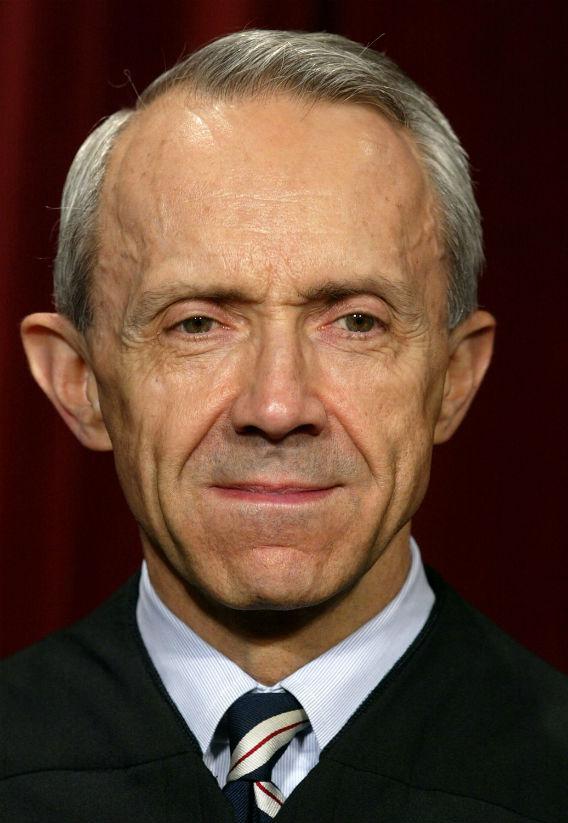The New Yorker’s Jeffrey Toobin this week revealed juicy bits from the Supreme Court’s deliberations as it considered Citizens United, the thunderous case in which the court allowed corporations and unions to spend unlimited sums on candidate elections, paving the way for big-spending super PACs. Toobin told of a secret draft Citizens United dissent by Justice David Souter that has never been released—a draft that Souter, who has since retired, should now make public.
Here’s the backdrop: Before Citizens United, the court twice upheld corporate spending limits, requiring that for-profit corporations spend money on elections only through political action committees funded by executives and shareholders. The court heard the Citizens United plaintiff’s challenge to those spending limits, on free-speech grounds, in March 2009, with a decision expected at the end of the term in June. In late April, Justice David Souter announced his retirement after the term’s end: Citizens United would be his last huge case. The court had an easy way to rule narrowly, without overturning the longstanding federal law barring corporations from spending their money on elections. But at the end of June, the court handed down no ruling, instead asking for more briefing on whether it should overrule the older cases that had upheld corporate spending limits. On the day the court issued that order, I wrote a Slate column speculating on the motivations: Maybe Chief Justice John Roberts and Justice Samuel Alito, who had not yet spoken on those earlier cases, did not want to overrule them on Justice Souter’s last day on the court, since he’d been an ardent defender of campaign finance laws.
Toobin’s reporting, based upon unnamed sources, tells a different story: That spring, the court’s conservative majority of five was ready to overturn the earlier cases upholding limits on corporate money in elections. In response, he reports, “Souter wrote a dissent that aired some of the Court’s dirty laundry. By definition, dissents challenge the legal conclusions of the majority, but Souter accused the Chief Justice of violating the Court’s own procedures to engineer the result he wanted.” Toobin doesn’t give details, but one point Souter was likely making was that the court was violating its rule against deciding issues the parties didn’t raise and the court didn’t ask them to address. Roberts, worried that Souter’s “bridge-burning farewell” would “damage the Court’s credibility,” maneuvered to have the case rebriefed and reargued the following term, which would remove the objection that the conservative majority was sandbagging the moderate-liberal minority.
Supreme Court watchers Tom Goldstein and Jonathan Adler have justifiably asked whether Toobin overreached in criticizing Chief Justice Roberts’ handling of the case, but the more interesting question is about the status of Justice Souter’s still secret and apparently blazing draft dissent. No law prevents retired Justices from releasing whatever papers they want, and they have adopted varying stances. Justice Souter has been among the most conservative, barring release of his papers for 50 years. Here’s why Souter should nonetheless release the dissent now—and if he won’t do it, why Justice John Paul Stevens (who has not been shy about speaking out about the wrongheadedness of Citizens United), and who has also since retired, should do so.
To begin with, the dispute at the heart of Citizens United is back before the court in a case out of Montana. The justices have already stayed a ruling by Montana’s highest court that thumbed its nose at Citizens United by holding that Montana could bar corporate money from elections, given the state’s history of corruption. The stay was accompanied by a condemnation of big money in elections from Justice Ruth Bader Ginsburg. A decision on whether the justices will hear the Montana decision or simply reverse it without argument is expected soon. Justice Souter was one of the court’s most passionate and articulate thinkers about campaign finance, and his dissent in Citizens United likely makes a top-notch argument for the constitutionality of corporate spending limits—an argument that’s directly relevant to the Montana case. Airing his dissent could help arguments against Citizens United we already have, in the published dissent of Justice Stevens, which is somewhat meandering and ineffective—not one of his best. Souter’s retirement is no reason for him to keep quiet. Justice O’Connor, after all, has been crusading against state judicial elections since she left the bench. Justice Souter cares deeply about campaign finance—why not make this his continuing cause?
The Souter opinion also might reveal just how far the conservative justices on the Supreme Court were willing to go to reach out and grab Citizens United. The court is decidedly not a place in which justice-umpires simply call balls and strikes, and Souter could remind us of that in the run-up to June’s rulings on health care reform and Arizona’s immigration law. Better to have a clear understanding of how ideology plays into some of the court’s decisions than to preserve an illusion of pure lawyerly analysis.
The chances that Souter, an intensely private person, will do as I’m suggesting are admittedly low. Stevens probably won’t publish Souter’s dissent either. But they should, because this isn’t about airing the court’s dirty laundry. It’s about telling the truth about how the court handed down Citizens United and making the best argument for why it should be overturned—and that would be a real public service.
